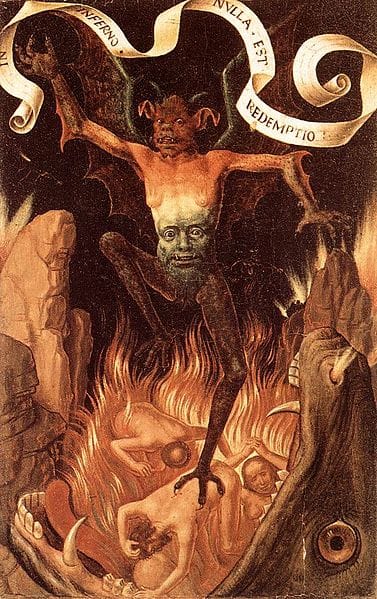Satan in the Bible

Satan does not appear by name in Genesis at all, unless we identify him with the Snake (as many do), or we rely on mis-translations of the original Hebrew into Greek (the Septuagint). For example, in The Book of Job, chapters 1-2, what is often now translated as "Satan" is simply "adversary" in the Hebrew. Put a capital letter at the front of a word and you've created a character! Satan is not in the Talmud either but the Qur’an and the New Testament give him a prominent role and many associate him with the Dragon in Revelation. You also can find him in Zechariah 3.
Therefore, despite the profusion of terms and mistranslations, Satan is still the one with the most stature. He starts out working for God and evolves into an adversary, perhaps under the influence of Persian thinking.
By the medieval era the name Lucifer (light-bearer) had been added to the mix. Although Lucifer is mentioned by name in Isaiah 14: "How art thou fallen from heaven, O Lucifer, son of the morning!" this is a misunderstanding. Lucifer is a Latin word and when St. Jerome used it, he was referring to the morning star in Roman astronomy (what we now call Venus). Yet, by the early medieval period when the Holy Grail stories and the Cathars were popular, Lucifer had come to be associated with Satan, since there was something very liberating about picturing him as a beautiful fallen angel (a falling star). The image up top of Lucifer is a marble statue from the Cathedral Saint-Paul de Liège, Belgium.

Then there is The Devil (from the Greek diabolos). He appears in the New Testament but the references seem to be synonymous with demons and they lack the stature associated with Satan. The term Devil only catches on in the medieval period as an alternative name for Satan, when depictions became more grotesque, as in the Hans Memling painting above. After this, devils became "The Devil"... And Mephistopheles.
A related question is whether Adam and Eve were Jewish. Judaism, Christianity and Islam all hold that humans are descended from them, but as literary characters it is fair to say they were (or are) indeed Jewish because they made their first appearance in Genesis, a work written by Jews. There are plenty of great Jewish jokes on the subject.
